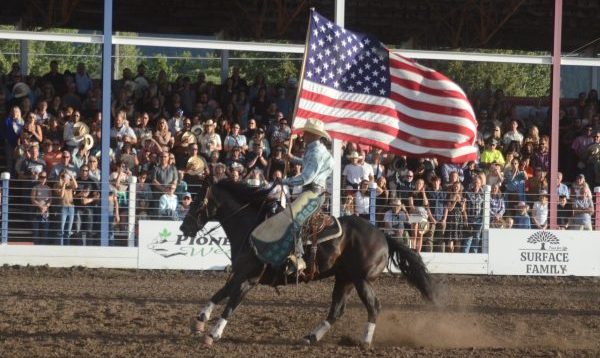General fund to cover wolf bill’s first year
Published 5:00 pm Wednesday, July 6, 2011
Oregons wolf compensation bill has passed the states legislature and now only awaits Governor John Kitzhabers signature before becoming law in Oregon.
The legislature, through House Bill 3560, establishes the Wolf Management Compensation and Proactive Trust Fund and appropriates $100,000 from the states General Fund for the 2011-2012 biennium. The money is to be used to compensate ranchers who lose livestock or working dogs to wolf depredation and to provide financial assistance for those who implement livestock management or non-lethal wolf control and deterrence techniques designed to discourage wolves from preying upon livestock. Thirty percent of the fund is to be used on non-lethal and preventive management techniques.
Trending
The $100,000 will last about a year, said Oregon Cattlemens Association political lobbyist Jim Welsh. Welsh based his one-year estimate on wolf predation levels on livestock in Oregon during the past two years, he said.
For the next biennium, 2013-2014, Welsh estimated the funding amount would need to increase to $500,000 to cover losses and preventive measures given the expected growth of the wolf population in Oregon.
He said the source of future funding after this current biennium has yet to be determined. I dont think weve really figured that out yet, he said.
State Rep. Greg Smith, R-Heppner, is the key author and sponsor of HB 3560 and said in a recent interview with the Chieftain, This is just one more step down the path of protecting our cattlemen and our stock growers. In no way does HB 3560 finalize the issue, but its a step toward providing greater common sense in utilizing our natural resources. The groups that worked together in drafting HB 3560 included the Oregon Cattlemens Association, Defenders of Wildlife and representatives from Gov. Kitzhabers office.
The importance of this progress was in bringing a diverse group together to sit at the same table to reach an understanding that our cattlemen and stock growers are important to the states economy, Smith said.
Welsh said the state has increased the overall predator control budget to $740,000 from the General Fund for this biennium. The amount budgeted for the 2009-2010 for control of coyote, cougar, bear and other predators was only $240,000.
Trending
That will certainly help a lot, and we definitely need the legislature and governor to know that the cattlemen appreciate that, Welsh said.
Wallowa County rancher and wolf coordinator for the Oregon Cattlemens Association Rod Childers voiced appreciation to the state legislature for supporting the bill and also acknowledged that there were compromises drawn in the measures final draft.
Its not everything we asked for, but it is a start, Childers said. Im pleased that it passed. Were going to need a lot more than what we got not in terms of dollars, but in terms of process. We gave up some things to get it this far, he added.
Childers mentioned that part of the compromise dealt with the final wording of the bill that compensates ranchers for livestock that are confirmed by state and federal agencies as wolf kills. The cattlemen wanted a compensation program that paid producers for losses that went above historically normal losses because of the difficulty of locating dead livestock. He said a high number of cattle have gone unaccounted for and he suspects it is due to wolf predation.
During the past two years, local rancher and president of the Wallowa County Stockgrowers Association Todd Nash has had three cows confirmed as wolf kills by USDA Wildlife Services, but claims to have 36 cows that have gone missing. He said that ranchers in the Divide area east of Joseph listed 50 head of cattle in 2010 that were never located, and he suspects that many of those were preyed upon by wolves.
HB 3560 specifies that monies are to be provided first to confirmed kills, second to probable kills, and, if funds remain, third on livestock lost to wolf attack based on above-normal historic losses.
The bill puts the responsibility of dispersing funds to ranchers at the level of local county government. To be involved in the compensation program, counties must establish a program and form an advisory committee. Wallowa County is currently the only county to form an advisory committee, according to county commission chairman Mike Hayward.
I think were the only county in the state with a committee. The make-up of our committee isnt exactly what is specified in the bill though. I think were going to have to tweak our committee, Hayward said.
The bill calls for the county committee to have one county commissioner, two members who own or manage livestock, two members who support coexistence and conservation of the wolf, and two county business representatives.
Another group led by Wallowa County Commissioner Paul Castilleja continues to support the total eradication of the gray wolf in Oregon.
The bill passed because the cattlemen want to manage the situation and be compensated for cattle, Castilleja said. It is an equitable solution as the governor stated. I think it is a compromise to go along to get along.
Im afraid the wolf wars are just at the very start, Castilleja added. I feel this will be a long battle to fight every year from here on out. Add to that, the dilemma of the rights of animals being more important than the rights of people. Ill continue to keep a firm stance on eradication and Ill keep trying to deliver that. I feel like most livestock producers feel that way too, Castilleja said.









